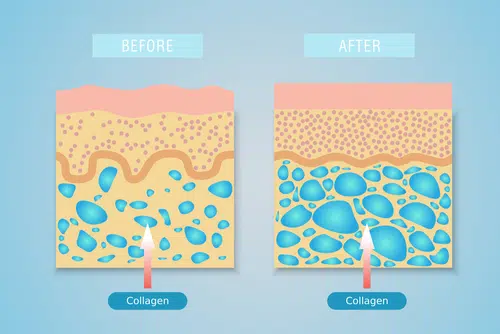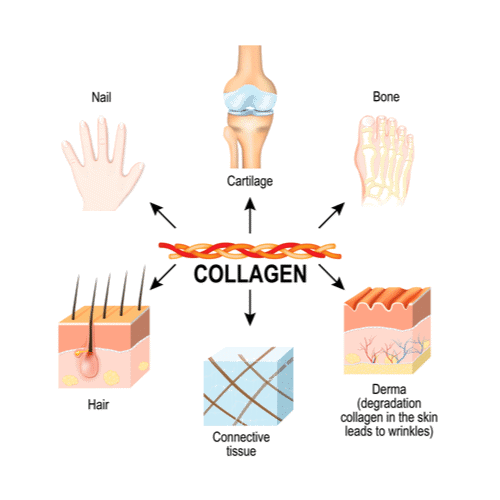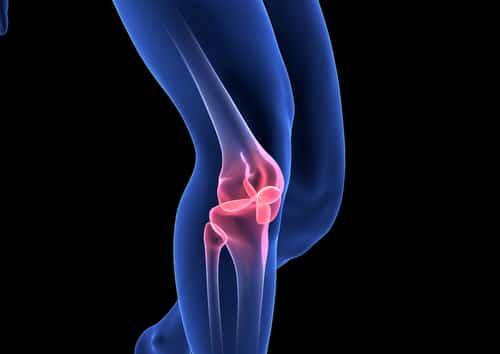Druggenius.com is reader-supported. We may earn a commission through products purchased using links on this page. Learn more about our editorial process here.
Collagen is found almost everywhere in your body. With supplements offering benefits from healthier, younger-looking skin, healthy hair and nails, stronger joints and bones, and even better gut health, collagen can sound too good to be true.
Research done into the potential benefits of collagen has supported the claims of these supplements, and so the demand for collagen is booming.
We want to find out how long it takes for collagen supplements to work, and what factors could affect the time we would need to wait to see results.
What Is Collagen?
Collagen is a protein found in your body and is especially abundant in your skin, muscles, bones, joints, and digestive tract.
Collagen is rich in amino acids, which are important to maintain and repair tendons, joints, and bones.
Natural collagen production decreases by around 1% every year, starting in your mid-20s. During menopause, women can also lose up to 30% of their natural collagen stores.
While age is the biggest factor contributing to collagen depletion, external factors can also further lower your collagen levels. These can include environmental pollutants, smoking, excessive alcohol consumption, poor diet, and prolonged sun exposure.
Collagen supplements can be important to encourage collagen production and with so many boasted benefits, it seems like an easy decision to add them to our daily routine.

But how long do we have to wait before we see results?
How Long Does It Take For Collagen Supplements To Work?

Better Skin
Collagen is important for regulating blood flow to your skin to keep it looking healthy and plump. It is also important for skin density and elasticity, keeping wrinkles and other signs of aging at bay.
Collagen also helps to repair skin, speeding up healing wounds. Studies have shown that using collagen supplements daily can heal wounds heal twice as fast. Applying collagen topically also helps to treat scars and improve the overall appearance of your skin.
Collagen supplements containing hydrolyzed type I collagen peptides are the most beneficial to your skin because they are easily absorbed into your bloodstream. Type I collagen promotes the production of important molecules that make up your skin, namely elastin, and fibrillin.
Collagen supplements aimed at improving skin can take from 1 to 3 months to work.
For more minor problems such as dry, dull-looking skin, some people see results after using collagen supplements for between a few days and a month. To maintain these results, it is recommended to take collagen daily for at least 3 months.
People who used collagen for 3 months saw up to a 30% reduction in the appearance of wrinkles.
Joint Function

Type II collagen is an important structural component for cartilage in joints. It helps to maintain and repair joints, reduce pain and swelling, reduce stiffness, and improve joint function.
Reducing pain and swelling in the joints makes taking collagen supplements a great way to manage joint disorders like arthritis.
Type II collagen can take anywhere from 3 to 6 months to work in joints and cartilage.
Collagen can increase localized joint support, improving functioning and reducing stiffness, in just 12 weeks.
Athletes who took regular doses of type II collagen reported feeling better overall joint health and comfort. This is a strong indicator of the benefits of using collagen supplements if you have an active lifestyle or experience joint pain because of strenuous training.
Bone Density
Type I collagen makes up around 90% of the collagen found in the body, including 90% of the total organic matrix in bones.
The high levels of type I collagen found in and around your bones provide structure to and repair bones, making them stronger.
Bones are primarily made up of collagen and calcium. Collagen peptides are thought to be able to boost calcium absorption, making it a useful supplement to improve the bone density that naturally depletes as you age. Women can lose significant amounts of their bone density during menopause because of raised estrogen levels.
Women who took collagen supplements for a period of 12 months experienced an increase in bone mineral density that was previously lost through menopause.
If you are taking collagen supplements primarily to increase bone density, it could take up to a year to feel results.
Muscle Mass
Collagen makes up between 1 and 10% of muscles, making collagen supplements helpful in maintaining and increasing muscle mass, but only when paired with exercise or weight training.
Collagen is an important protein in your body, but because it is missing an essential amino acid (tryptophan), it is considered an incomplete protein. This is what makes exercise an important addition to collagen supplements in order to see results.
Much like collagen, muscle mass naturally depletes with age. So, is collagen good for men?
In studies measuring the relationship between collagen and muscle mass, men who took collagen while weight training gained more muscle mass than men who did not take collagen supplements.
Feeling results can take only a few days after taking collagen daily. Collagen helps reduce the after-effects of heavy training or workouts, like stiffness or soreness in the muscles, within a week.
Long-term effects like increased muscle mass can be measure after around 3 months and is only effective if paired with regular exercise.
Gut Health

Collagen is made up of multiple amino acids, including proline, glycine, and glutamine. These three amino acids are essential in building and maintaining the connective tissue in your digestive tract and stomach.
Collagen has also been reported to aid digestion and repair the lining of your stomach. This could be beneficial to people struggling with irritable bowel syndrome (IBS), leaky gut syndrome, and other uncomfortable digestive issues.
Type III collagen peptides are recommended for those of you who are looking to improve gut health. It is also recommended to take collagen supplements that are hydrolyzed or contain collagen peptides specifically.
Collagen is already broken down in these forms, and so is easier to absorb and digest.
How quickly collagen supplements work to support gut health depends heavily on your body and diet. Because collagen is an incomplete protein, a proper diet helps to make up the missing amino acids your body needs.
Diet can also affect the effectiveness of collagen supplements if you have digestive difficulties because of the effect of certain foods on your body. While there are plenty of foods that are an excellent source of collagen, like citrus fruits and beans, there are some that harm your collagen production.
If you find that you’re still suffering the effects of low collagen levels, consider cutting back on refined sugars and carbohydrates. These have been shown to have a deleterious effect on collagen production.
Better digestion and other benefits associated with good gut health can take around 1 to 3 months of consistent doses of collagen to achieve. Does collagen make you poop?
Hair And Nail Health
Many collagen supplements claim to improve hair and nail health and appearance, but there is limited evidence to support this.
Your hair and nails are made up mainly of keratin, which depends on amino acids for production. This is why the amino acids found in collagen could be beneficial for increased keratin levels.
While some collagen users have reported having healthier hair, research shows their nails have more noticeable results.
After taking collagen for around 6 months, there was evidence of better nail growth, an improved appearance, and less breakage compared to the nails of people who did not take collagen.
What Can Affect These Results?
How quickly collagen supplements work can depend on various internal and external factors.
In terms of the supplement itself, it’s important to take note of the dosage instructions in particular. Some supplements will have different dosage instructions to others containing the same ingredients, which could affect how long it takes to see results.
The ingredients used in your supplements are also an important factor. If the ingredients aren’t properly sourced or are of low quality, you could be waiting longer than promised to get results.
Included in the ingredients is the type of collagen that is in your supplement. Collagen comes from tissues extracted from chicken and cow meat, and even from the membranes of eggshells. This makes many forms of collagen unacceptable for vegetarians or people with fish allergies.
The ingredients list on your supplements should indicate the source of the collagen, so you can tell if it’s suitable for you.
The type of collagen or mix of collagen in your supplements needs to be focused on the areas you want to improve. If you want skin, hair, and nail benefits, type I is the best for you. But if you want joint pain relief, type II would be better.
Other factors that affect how long it takes for the supplements to work are mostly biological. This can be your age, diet, or your initial collagen store levels.
If you have naturally lower collagen levels, it could be a matter of days before you start to see changes. This is because your body’s collagen production will have a significant increase, unlike people who take supplements and already have higher collagen levels.
Age has a similar effect on how long it takes for the supplements to work, with older men and women seeing more drastic results.











